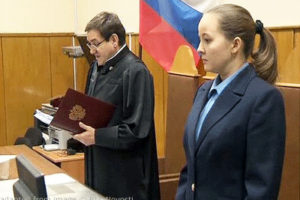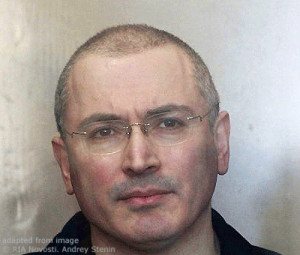Khodorkovsky Marks the Spot: Russia’s Turning Point From Economic Freedom to State Control

(Russia Matters – russiamatters.org – Sergei Guriev – May 28, 2020)
Sergei Guriev is a professor of economics at Sciences Po in Paris.
This month fifteen years ago, Russia’s richest person, CEO and main shareholder of YUKOS oil company Mikhail Khodorkovsky, was sentenced to nine years in prison in what became a turning point in the development of Russian political and economic institutions on Vladimir Putin’s watch.
 After the turmoil of reforms in the 1990s and the 1998 financial meltdown, Putin came to power with an agenda of restoring rule of law and relaunching economic growth. The timing was perfect for him: he first became the prime minister, then acting president and was then elected president at the moment when oil prices started to rebound after a long slump and market reforms initiated in the 1990s started to pay off. The first few years of Putin’s rule delivered a mixed message. On one hand, he put together an impressive team of economic reformers who continued the aforementioned changes, overhauling the country’s ineffective tax system, creating a land market and deposit insurance system, deregulating small business and achieving macroeconomic stability. On the other hand, from the very start, Putin’s administration focused on centralizing political institutions, suppressing media freedom and signaling that it would not tolerate dissent. Still, from today’s point of view, Russia was unimaginably free in the early 2000s. There were independent TV stations and parliamentary parties, political prisoners and tortures were unheard of and street protests were still allowed both de facto and de jure.
After the turmoil of reforms in the 1990s and the 1998 financial meltdown, Putin came to power with an agenda of restoring rule of law and relaunching economic growth. The timing was perfect for him: he first became the prime minister, then acting president and was then elected president at the moment when oil prices started to rebound after a long slump and market reforms initiated in the 1990s started to pay off. The first few years of Putin’s rule delivered a mixed message. On one hand, he put together an impressive team of economic reformers who continued the aforementioned changes, overhauling the country’s ineffective tax system, creating a land market and deposit insurance system, deregulating small business and achieving macroeconomic stability. On the other hand, from the very start, Putin’s administration focused on centralizing political institutions, suppressing media freedom and signaling that it would not tolerate dissent. Still, from today’s point of view, Russia was unimaginably free in the early 2000s. There were independent TV stations and parliamentary parties, political prisoners and tortures were unheard of and street protests were still allowed both de facto and de jure.
This contradiction between Putin’s economics (in favor of economic freedom) and politics (against political liberties) was resolved in October 2003 when Mikhail Khodorkovsky was arrested. Khodorkovsky was not the first oligarch harassed by Putin, but this was indeed a turning point. Khodorkovsky was the richest man in Russia at that point precisely because he cleaned up his oil company’s corporate governance. YUKOS’ market capitalization soared. It became the darling of foreign investors; there was a credible offer from one of the U.S. majors to buy a stake in YUKOS. However, Putin disliked the fact that Khodorkovsky publicly criticized corruption in the top ranks of Putin’s administration and established a pro-democracy philanthropic organization among other things. Given the approaching parliamentary elections in December 2003 and the fact that Khodorkovsky had supported opposition parties, Putin decided to strike. Khodorkovsky was arrested; two years later he was sentenced; four years later his company ceased to exist, with most assets going to state oil company Rosneft, run by Putin’s old friend Igor Sechin. Today, Rosneft is one of the largest oil companies in the world while Khodorkovsky, whom Putin pardoned in 2013, is living abroad in exile.
The 2005 sentence was not just important in clarifying Putin’s vision for Russia-the one based on centralized control of politics and state ownership-but it also buried any hopes for an independent judiciary in Russia. Both the first and second YUKOS cases exposed the fact that sentences were dictated by the executive. I have not followed the first YUKOS case closely; however, when in 2011 then-president Dmitry Medvedev asked me (along with eight other experts) to evaluate the verdict in the second case, I was shocked to realize that the verdict did not contain any proof of guilt. All experts stated-unanimously but independently of each other-that the prosecutors did not build a convincing case and that the verdict would have to be appealed. It was in fact overruled by the European Court of Human Rights (which is legally Russia’s highest court). The Russian Federation has not appealed the ECHR’s ruling, thus implicitly confirming that the original verdict should be annulled.
Article also appeared, with different images, at russiamatters.org/analysis/khodorkovsky-marks-spot-russias-turning-point-economic-freedom-state-control, with different images, bearing the notice: “© Russia Matters 2018 … This project has been made possible with support from Carnegie Corporation of New York,” with a footer heading entitled “Republication Guidelines” linking to: russiamatters.org/node/7406, which bears the notice, in part:
“If you would like to reprint one of these articles, a blog post written by RM staff, one of our infographics or a fact-check, we ask that you follow these guidelines:
- Include a prominent attribution to Russia Matters as the source and link back to the original at RussiaMatters.org.
- Retain the hyperlinks used in the original content.
- Do not change the meaning of the article in any way.
- Get an ok from us for non-substantive changes like partial reprints or headline rewrites and inform readers of any such modifications (e.g., This article first appeared on the Russia Matters website with the headline “Russian Election Interference in Trump’s Own Words”).
- Let us know about the reprint and send a link!
Please note that Russia Matters cannot grant permissions for third-party content, including articles, photographs and other materials not produced by our team.
Questions? Email us at RussiaMatters@hks.harvard.edu.”
[featured image is file photo]
